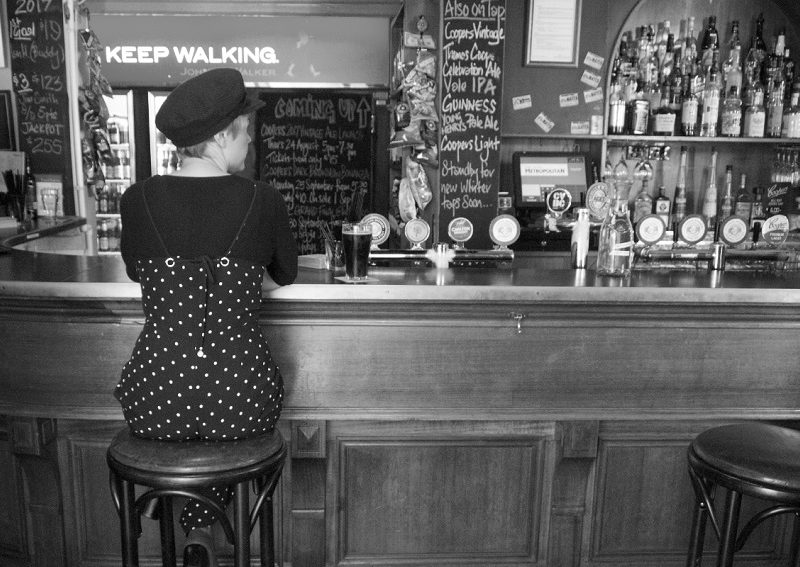
Royce Kurmelovs
Royce Kurmelovs is an Australian freelance journalist and author of The Death of Holden (2016), Rogue Nation (2017) and Boom and Bust (2018).

It’s May Day at the Mawson Lakes Hotel, where Royce Kurmelovs meets a Wobbly industrial salesman who knows one thing for sure: the robots are coming.
As the clock ticks on past five, the knock-offs head over to the sports bar at the Mawson Lakes Hotel on this chilly, overcast Tuesday afternoon and start working out who’s going to buy rounds. Entire retail crews settle around their tables and at the bar, two men whose age is measured in their gut nurse beers while they talk politics.
The Mawson Lakes Hotel is not an old place, nor is it a place steeped in working class history. It rose when the state government kept on at plans to build a “multifunction polis” on the swampland 10 minutes north of Gepps Cross. It serves university types, sales staff and bar flies alike and when Jordan Parry of the Industrial Workers of the World walks into the building, they’re about to serve a labour organiser too.
You’d never know from the atmosphere, but today is May Day, one of the biggest dates in a unionist’s calendar. Back in 1886 crowds filled Haymarket Square in Chicago to protest for the right to an eight-hour work day. Over the course of the event, bombs were thrown into the crowd and when it all washed out, eight labour organisers went to the gallows on conspiracy charges.
When news of what happened spread across the Pacific, organised labour in Australia took up the cause. Every year since, they celebrate May Day with a dinner and a march the Saturday after. The dinner is a kind of Christmas for the working class, though getting a table costs $45 a head. As a freelance worker in the gig economy, that’s too rich for my blood so instead of drinking with the old timers, Jordan offers to buy me a round after he knocks off.
“I still think we should be marching on the actual day,” Jordan says as he puts two pints down on the table and we cheers to capitalism.
Just like everyone else these days, Jordan Parry is a salesman at a machine shop and if you ask him, he sucks at it. If a call comes in about a technical problem or a design issue, Jordan’s your guy. He’ll walk you through every step. When it comes to billing, the person on the phone can take it to the next company who beats it by five percent.
“Actual engineering guys will appreciate that and will grow a bit of loyalty towards you when you help them out. Purchasing officers? It’s just the bottom line. It’s all they look at,” he says.
Jordan is a toolmaker by trade. At the age of 17 he had started out wanting to be a journalist, but after three months of a diploma in creative writing worked out that the business of words for money involved sitting inside all day by himself so he quit to find an apprenticeship.
“It’s a quasi-relationship you do develop with your machine,” Jordan says. “When you’re running a machine day in, day out, they do develop characteristics. They develop particular idiosyncrasies.”
In a couple of years he was working those machines so well, the chatter and clang might as well have been Bach. It was mind-numbing work and after a few years he had three kids to support. When the job in sales came along, he couldn’t say no.
That’s when I ask Jordan about his feelings towards bourbon. He feels great about it, he says, so I buy another round and we talk politics.
For years he used to be a keyboard warrior, Jordan says, until he read a report saying that 62 people own half the world’s total wealth. With that he decided what he was doing wasn’t working, so he closed the laptop and joined the Wobblies. As a radical labour union with no real presence in Australia, there wasn’t a branch in Adelaide when he joined up. Now the Wobblies count 24 among their ranks.
“We’re bigger than Melbourne now, I think,” he says. In the world of organised labour, that’s bigger than Jesus.
Now he’s actually doing something. They hold meetings and run campaigns. The other unions are supportive, Jordan says, but they think they’re “cute”. Jordan doesn’t mind though. This is a changing world, he says. Humans might work eight hours but robots don’t sleep. It’s best to organise now any way they can because these days it seems like there’s an algorithim for everything.
One time Jordan read a story about someone somewhere who developed an algorithm to write classical music. It composed a new symphony in Bach’s style and when they held a concert, they played the machine-written symphony next to an original. No one could tell the difference.
“And there was nearly a riot in this place,” Jordan says. “But, you know, writing is a skill as well. After all the robots are doing our jobs, it might be one of the only skills that’s valued, though maybe not pulp fiction and that sort of a stuff.
“Dan Brown might be out of a job.”

Royce Kurmelovs is an Australian freelance journalist and author of The Death of Holden (2016), Rogue Nation (2017) and Boom and Bust (2018).